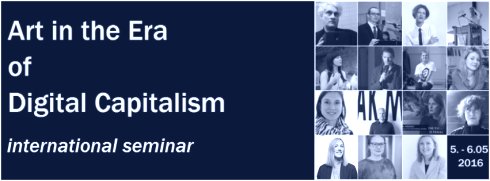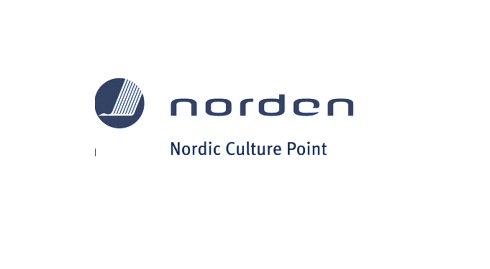International symposium Art In the Era of Digital Capitalism
The registration form is available: http://goo.gl/forms/fz7sGjkZc8
The fee (5 EUR) will be collected at the entrance. Students with a valid student card have free entrance.
The symposium will be fully in English.
Center for Contemporary Arts, Estonia invites:
International symposium Art In the Era of Digital Capitalism
5 — 6 MAY 2016 at Estonian Centre of Architecture (Põhja pst 27a)
International symposium Art In the Era of Digital Capitalism focuses on the contemporary work ethics in the context of art field. What could be the function of publicly funded art institutions today? How do Estonian art institutions fit with the current trends of art market? How to put up with the market driven system that continuously asks you to produce more new wonderful works and ideas as an artist?
The keynote speaker of the event is Italian philosopher, activist and marxist thinker Franco ‘Bifo’ Berardi. Keynote lecture is followed by panel discussions attended by artists, theorists and representatives of art institutions. All panels are open for the audience in order to together map and solve most important issues in contemporary art field today.
THURSDAY, MAY 5, 2016
11:30 Welcome and introduction by Center for Contemporary Arts, Estonia
11:45 Daniele Monticelli (Tallinn University) introduces the keynote speaker
12:00 Keynote lecture by Franco „Bifo“ Berardi
Franco “Bifo” Berardi’s newest book analyzes the contemporary changes taking place in our aesthetic and emotional sensibility—changes the author claims are the result of semio-capitalism’s capturing of the inner resources of the subjective process: our experience of time, our sensibility, the way we relate to each other, and our ability to imagine a future. Precarization and fractalization of labor have provoked a deep mutation in the psychosphere, and this can be seen in the rise of psychopathologies such as post-traumatic stress disorder, autism, panic, and attention deficit disorder. Sketching out an aesthetic genealogy of capitalist globalization,
Berardi shows how we have arrived at a point of such complexity in the semiotic flows of capital that we can no longer process its excessive currents of information. A swarm effect now rules: it has become impossible to say “no.” Social behaviour is trapped in inescapable patterns of interaction coded by techno-linguistic machines, smartphones, screens of every size, and all of these sensory and emotional devices end up destroying our organism’s sensibility by submitting it to the stress of competition and acceleration.
13:15 Q&A with Franco ‘Bifo’ Berardi moderated by Daniele Monticelli
14:00 Lunch. Hungry Karl sells their food in front of the building
15:00 Community Art and New Art Institutions
Post-recession there has been a boom of community art projects world wide. In order to create culture that would bring different identities together, artists work in residencies, start project spaces outside prestigious centres of cities. Best known examples are Showroom in London, Tensta Konstall in Stockholm, Lost Property in Amsterdam, Wohnung Movement in Berlin, WAGE in New York, or some local examples are Metropol Gallery born out of Non-Grata, Nancy Nakamura Shelf of Ideas led by artist Kadi Estland, and free shop Kraam that grew out of Shelf of Ideas in Tallinn.
New formats have already grown out of community projects, that are internationally marketable. What started the boom? What are community projects reacting to? What does the community art boom look like by now? Has community art become part of neoliberal structure or is it challenging its weaknesses? What is the role of artist residencies in this process? What other agents effect developments of community art?
Panelists: Valeria Graziano (Middlesex University), Grégory Castera (Forms of Council), Haye Huib van der Werf (Academie Jan van Eyck).
Moderator: Rebeka Põldsam
17:00 Summary of the day by Mari Peegel (Estonian daily paper Eesti Päeveleht)
FRIDAY, MAY 6 2016
11:00 Pressures and Pleasures of an Artworker
“Never working, never not working” is the motto of today’s creative industry, which surrendered to a sort of “culturbocapitalism” that never fails to produce new work — and hence new value — at an ever accelerating speed.
What is the motivation behind keeping up with the speed and the increasing production? Which are the ways to oppose the pressure to perform? Networking and self-managing 24/7 has become an energy and time consuming part of your practice whether you work as an artist, independent curator, critic or in a smaller arts institution. How to deal with the controversial freedom of self-organising and the fact that perhaps there is no alternative?
Panelists: Katja Novitskova, Stephan Dillemuth, Sandra Jõgeva
Moderator: Margit Säde
13:00 Lunch. Hungry Karl sells their food in front of the house
14:00 What's the Point of Art Centres Anyway? * import, export and means of art promotion
/Changes in the institutional field in past years and what next?
In Estonia, Temnikova&Kasela Gallery was founded in 2010 and Estonian Contemporary Art Development Center in 2012 for developing art market in Estonia and introduce Estonian art in international context. Frame Finland holds the role of both developing art market of Finland as well as curating non-profit events and holding discussions that heat up the local artist community in addition to that commissioning Finish Pavlion at la Biennale di Venezia. CCA Estonia has simlar role to Frame, exept we do not give out grants anymore and also don't participate so directly in art export.
What are the dilemmas in developing a small countries art field and market in 2016? What is the role of public institutions that work not for profit?
Panelists: Taru Elfving (Frame Finland), Olga Temnikova (Temnikova & Kasela Gallery), Maria-Kristiina Soomre (Ministry of Culture), Kadri Laas (Estonian Contemporary Art Development Center).
Moderator: Maria Arusoo.
16:00 Summary of the day by Kadri Karro (Estonian weekly newspaper Eesti Ekspress)
16:15 Closing words by CCA, Estonia
Supported by: Eesti Kultuurkapital, Prantsuse Instituut, fritz-kola Eesti, Selveri Köök, Nordic Hotel Forum, Viking Line, Nordic-Baltic Mobility Programme for Culture

